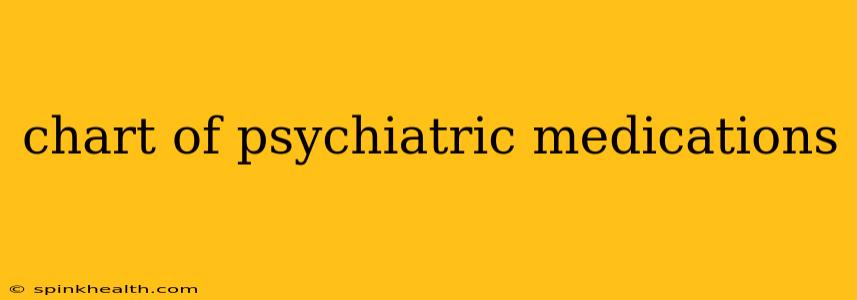Navigating the World of Psychiatric Medications: A Comprehensive Guide
The world of psychiatric medications can feel overwhelming. With so many different drugs available, each with its own mechanism of action, side effects, and potential interactions, it's understandable to feel lost. This isn't a chart in the traditional sense, but rather a narrative guide designed to help you understand the landscape of psychiatric medications, empowering you to have more informed conversations with your healthcare provider. Remember, this information is for educational purposes only and should not replace professional medical advice. Always consult your doctor or psychiatrist before starting, stopping, or changing any medication.
This guide will explore different classes of psychiatric medications, touching upon their common uses, potential side effects, and considerations. We'll address some frequently asked questions to paint a clearer picture.
What are the main classes of psychiatric medications?
Psychiatric medications are broadly categorized into several classes, each targeting different neurotransmitter systems in the brain. These classes often overlap in their uses and side effects.
-
Antidepressants: These medications primarily affect serotonin, norepinephrine, and dopamine levels in the brain. They are commonly used to treat depression, anxiety, and some other conditions. Subtypes include Selective Serotonin Reuptake Inhibitors (SSRIs), Serotonin-Norepinephrine Reuptake Inhibitors (SNRIs), Tricyclic Antidepressants (TCAs), and Monoamine Oxidase Inhibitors (MAOIs). Each subtype has a unique profile of side effects and interactions.
-
Anti-anxiety Medications (Anxiolytics): These medications are used to treat anxiety disorders. Benzodiazepines are a common type, known for their rapid onset of action but potential for dependence and withdrawal symptoms. Buspirone is another example, which works differently and carries a lower risk of dependence.
-
Antipsychotics: These medications primarily block dopamine receptors in the brain and are used to treat psychosis, schizophrenia, bipolar disorder, and other conditions. They are categorized into typical and atypical antipsychotics, each with varying side effect profiles. Atypical antipsychotics generally have a lower risk of certain movement disorders (tardive dyskinesia) associated with typical antipsychotics.
-
Mood Stabilizers: These medications are primarily used to treat bipolar disorder, characterized by periods of mania and depression. Lithium is a classic mood stabilizer, requiring careful monitoring of blood levels. Anticonvulsant medications like valproate and lamotrigine are also used as mood stabilizers.
What are the common side effects of psychiatric medications?
Side effects vary greatly depending on the specific medication and the individual. Some common side effects across various classes include:
- Weight gain or loss: Many psychiatric medications can affect appetite and metabolism.
- Sleep disturbances: Insomnia or excessive sleepiness are common.
- Sexual dysfunction: This can manifest in various ways, including decreased libido or difficulty achieving orgasm.
- Gastrointestinal issues: Nausea, constipation, or diarrhea are possible.
- Drowsiness or sedation: This is more common with some medications than others.
- Headaches: Frequent headaches can be a side effect.
It's crucial to discuss any side effects with your doctor. Many side effects can be managed or mitigated.
How long does it take for psychiatric medications to work?
The timeframe for noticing improvement varies depending on the medication and the individual. Some medications provide quicker relief, while others may take several weeks or even months to reach full effectiveness. It's important to be patient and work closely with your doctor to monitor your progress.
Are there any natural alternatives to psychiatric medications?
While lifestyle changes like regular exercise, a healthy diet, sufficient sleep, and stress management techniques can be beneficial for mental health, they are generally not sufficient as stand-alone treatments for severe mental illnesses. They can be helpful adjuncts to medication, but should never replace professional medical advice or prescribed medication.
What about drug interactions?
It's vital to inform your doctor about all medications, supplements, and herbal remedies you are taking, as interactions can occur. This includes over-the-counter medications.
This is not an exhaustive overview, but rather a starting point to facilitate a more informed discussion with your healthcare provider. Remember, seeking professional help is crucial for managing mental health conditions. Your psychiatrist or doctor is your best resource in selecting the right medication and dosage for your specific needs. They can monitor your progress and adjust treatment as needed. Don't hesitate to ask questions and advocate for your well-being.

